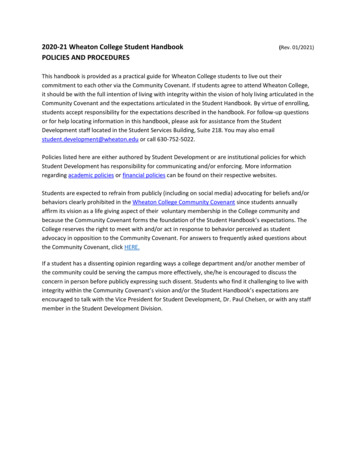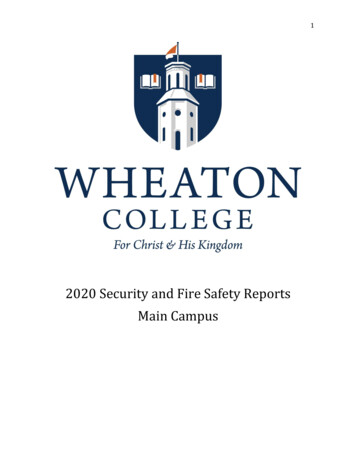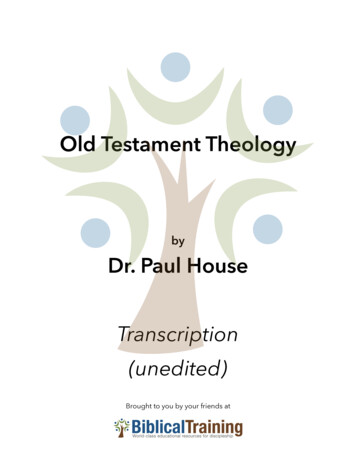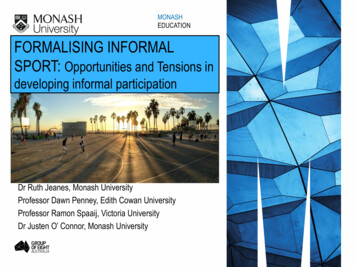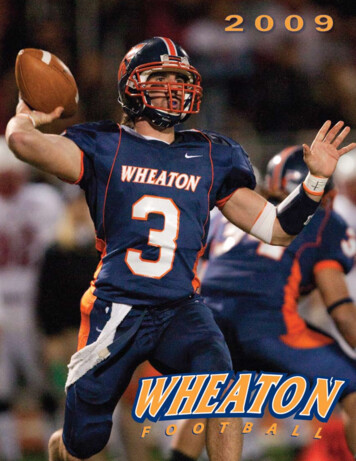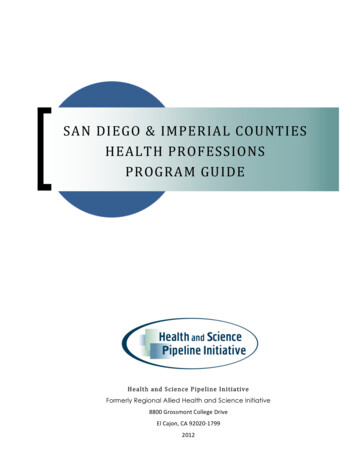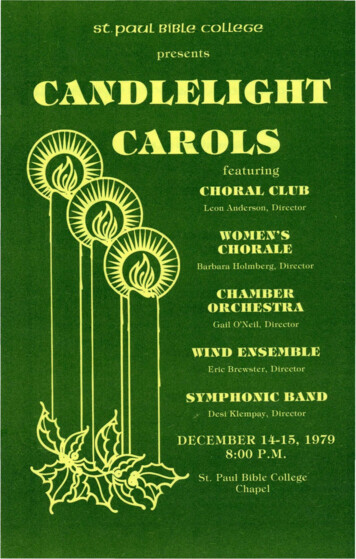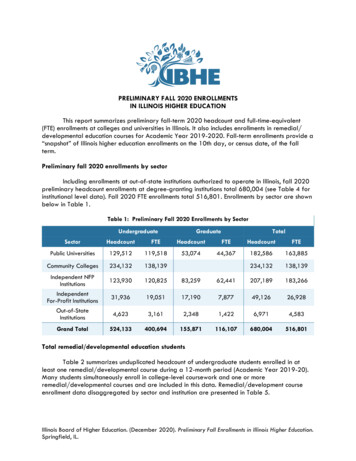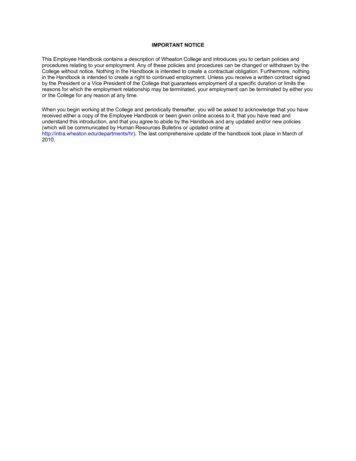
Transcription
IMPORTANT NOTICEThis Employee Handbook contains a description of Wheaton College and introduces you to certain policies andprocedures relating to your employment. Any of these policies and procedures can be changed or withdrawn by theCollege without notice. Nothing in the Handbook is intended to create a contractual obligation. Furthermore, nothingin the Handbook is intended to create a right to continued employment. Unless you receive a written contract signedby the President or a Vice President of the College that guarantees employment of a specific duration or limits thereasons for which the employment relationship may be terminated, your employment can be terminated by either youor the College for any reason at any time.When you begin working at the College and periodically thereafter, you will be asked to acknowledge that you havereceived either a copy of the Employee Handbook or been given online access to it, that you have read andunderstand this introduction, and that you agree to abide by the Handbook and any updated and/or new policies(which will be communicated by Human Resources Bulletins or updated online athttp://intra.wheaton.edu/departments/hr). The last comprehensive update of the handbook took place in March of2010.
OUR COMMON MINISTRY: FAITH AT WORKAs members of the Body of Christ called to works of service at Wheaton College, we believe that our personal faith inChrist Jesus is to transform every area of our common life. Through programs of Christian higher education, WheatonCollege strives to develop Christian students into whole and effective servants of Christ. The following statementexpresses what we believe and how we hope to work on campus and throughout the world “For Christ and HisKingdom.”We are called to works of service, not just employment, we are to “do all to the glory of God.” (Eph. 4:11; 1 Cor.10:31)We want to know Christ, “in whom are hid all the treasures of wisdom and understanding.” (Col. 2:2-3)We believe the Christian faith, rooted in scripture, helps us make sense of our world. Even more important, it not onlyilluminates and instructs, but also gives us the redemptive power, through the indwelling presence of the Holy Spirit,to be agents for Christ in our relationships and in the world in general. (Col. 1:15-27 and Dorothy Sayers, “TheMeaning of the Universe”, an address given at Kingsway Hall, London, March 6, 1946)We want our Christian faith to permeate and shape all of our thoughts, words and actions. Wheaton’s focus istherefore on the whole person (mind, spirit, and body) and on the integration of our faith and learning with everyaspect of our personal and common life. By integration, we mean that our faith provides the framework by which weunderstand the world around us. It is fundamental and primary, not a portion of our lives that we cancompartmentalize. (Rom. 1:16-17; 1 Cor. 3:18-20)We believe that excellence and success are best measured by things unseen rather than by things seen. All that wepossess and all that we have accomplished are to be valued only as a means to an end that “Christ and HisKingdom” are served in spirit and in truth. When offered to God, our most humble efforts are worthy. When done forour own glory or benefit, our best work is compromised by the sin of pride. (Luke 9:23; Phil. 1:21; and C.S. Lewis,“Learning in War-time,” The Weight of Glory and Other Addresses, 1949)We are “to speak the truth in love”, not simply to speak. “Love is patient, love is kind. It does not envy, it does notboast, it is not proud. It is not rude, it is not self-seeking, it is not easily angered, it keeps no record of wrongs. Lovedoes not delight in evil but rejoices with the truth. It always protects, always trusts, always hopes, always preserves.”(Eph. 4:15-16; 1 Cor. 13:4-7)We realize as individual members of a community that our words and actions can cause harm or be an opportunityfor growth and grace. We all learn and grow best in a loving and supportive community characterized by integrity,accountability and mutual commitment. (Eph. 4:1-3; 4:15-16)We believe that each part of the Wheaton College community is needed to do our work well. We recognize thatdifferences of age and gender, race and ethnicity, and status and position can easily be the basis for harm anddivisions within a community of believers and society generally. Our common ministry is strengthened as we arejoined together in works of service, not pulled apart and divided by differences. (Eph. 4:11-16; 1Cor. 12:4-26)We believe that developing effective Christian servants can be best done if all employees seek to have the samemind that was also in Christ Jesus. “Each of us should look not only to our own interests, but also to the interests ofothers.” We believe that it is easy to become weary in doing good. “Therefore, as we have opportunity, let us do goodto all people.” (Phil. 2:1-8; Gal. 6:9-10)We are humbled, challenged and encouraged by our call to this ministry offaith. (Eph. 4:1-6)
BACKGROUND INFORMATIONWheaton College began as a fledgling preparatory school known as the Illinois Institute, which was founded byWesleyan Methodists in 1853. Hampered by limited funds, the Institute’s trustees sought new leadership in JonathanBlanchard, then president of Knox College. Blanchard accepted on the condition that the school become a Christianliberal arts college. On January 9, 1860, a new and independent board established Wheaton College, with Blanchardas its first president. LEADERSHIPWheaton’s trustees and administrators continue the College’s fidelity to the historic Christian faith. This commitmenthas been a major influence in Wheaton’s pioneering role in Christian liberal arts education. STUDENT BODYWheaton compares favorably with the best colleges in the number of National Merit Scholars it attracts and in theaverage high school rank of incoming students. Wheaton students are highly motivated in their academic work andenjoy a wide range of extra-curricular pursuits (intellectual, artistic, social, and athletic). They have a high acceptancerate into medical and law schools, seminaries, and other graduate institutions. SCHOLASTIC THRUSTEducational programs are offered in the liberal arts college, as well as in the Conservatory of Music and in theGraduate School. Other learning resources include libraries, special collections, laboratories, computer facilities, theBilly Graham Center, HoneyRock (Wisconsin), and the Black Hills Science Station (South Dakota). SCRIPTURAL BASEWith the authority of Scripture as its keystone, Wheaton College encourages its 2200 undergraduates and 300graduate students to explore the implications of Christian belief in all spheres of life. Although united in a commonfaith, students, faculty, and staff are diverse in their religious traditions and expressions. They strive to apply biblicalprinciples in personal conduct and through concern for and practical service to others.The expanding programs of Wheaton College continue to serve the educational, cultural, and religious communities“For Christ and His Kingdom.”
DECISION-MAKING GROUPS BOARD OF TRUSTEESThe Board of Trustees determines the policies of and has final control over the affairs of Wheaton College. The Boardhas an Executive Committee and eight standing Committees: Academic Affairs, Advancement, Audit, Buildings andFacilities, Finance, Graham Center, Investment, and Student Development. Other committees, temporary orpermanent, may be created as needed.Two trustees are re-elected at each annual meeting in October, with the total not to exceed twenty members, all ofwhom serve ten-year terms. Other regular meetings of the Board are held in February and May. The chairman, thepresident, or any three elected trustees may request special meetings.In addition to elected trustees, there are two classes of advisory trustees: Advisory Life Trustees and TrusteesEmeriti. SENIOR ADMINISTRATIVE CABINETSAC,” the Senior Administrative Cabinet is composed of the President of Wheaton College, the Provost, the VicePresident for Finance and Treasurer, the Vice President for Advancement and Alumni Relations, and the VicePresident for Student Development. The group usually meets once a week to share information, to seek advice, andto make recommendations to the President regarding college decisions. Faculty committees and individualadministrators make recommendations to this group through the appropriate Vice President or the President.
REPORTING STRUCTUREEach Vice President administers a division of the College. An organizational chart of those divisions is available fromthe Human Resources Department.Employees of the College are directly responsible to their immediate supervisorsand indirectly responsible to the Vice Presidents of their divisions. Employee concerns or questions should bechanneled through the proper authority.More detailed information on reporting structures can be found in theorganizational manuals placed with each Vice President and the Director of Human Resources.
FINANCIAL MISCONDUCT & DISHONESTYPURPOSEThe College is committed to deterrence, detection and correction of financial misconduct and dishonesty. Discovery,reporting and documentation of such acts provide a sound foundation for the protection of innocent parties, taking ofdisciplinary action against offenders and referral to law enforcement agencies when warranted. This Policy includesspecific instructions about appropriate action in case of suspected financial misconduct and dishonesty.REPORTING RESPONSIBILITYEach trustee, volunteer, and employee of the College should report any suspected questionable or improperaccounting or auditing matters and other suspected incidences of financial misconduct or dishonesty such as theft ormisappropriation of funds and intentional misstatements of financial records (hereinafter collectively referred to asConcerns) to an appropriate administrator or the Human Resources Department. Such Concerns may also bereported anonymously by contacting EthicsPoint, an independent firm contracted by the College to receiveanonymous 2Concerns, as defied above, reported through EthicsPoint will be referred to the Chair of the Audit Committee.EthicsPoint will refer reports of inappropriate behavior not defined above, such as harassment or failure to live up tostandards embodied in the Community Covenant, to appropriate College administrators as defined in relevantCollege policies.) The Chair of the Audit Committee, with the assistance of other Committee members, Collegeadministrators and outside counsel as necessary, will investigate all reported Concerns and, if warranted by theinvestigation, will recommend appropriate corrective action to the Board of Trustees. Following completion of theinvestigation the Chair will give to the complainant, if known, a report of the results of the investigation, includingcorrective action taken, if any.
EMPLOYMENT POLICIESThese policies apply to all employees. All College policies are developed to enable employees to work together as anintegrated community. This handbook is designed to enhance the employees’ understanding of the workings of theCollege community and increase awareness of the employees’ obligations to it.GENERAL POLICIESCommunity Covenant and Statement of FaithFaith and Life-Style CommitmentsWheaton College is a Christian educational community. Therefore, by virtue of their employment by the College, andwhether they are full-time or part-time, all faculty members, administrators, and staff must accept the obligations ofmembership in the College community by committing annually to Wheaton’s Statement of Faith and CommunityCovenant, which follow. Commitment to these obligations applies continuously for the duration of employment, bothon and off work hours.Temporary employees are not required to subscribe to the Statement of Faith but are expected to honor theCommunity Covenant by reflecting its standards in their personal lives while on campus. Temporary visitingprofessors, special instructors, guest lecturers, and “on call” employees are also in this category.Community CovenantThe goal of campus life at Wheaton College is to live, work, serve, and worship together as an educationalcommunity centered around the Lord Jesus Christ. Our mission as an academic community is not merely thetransmission of information; it is the development of whole and effective Christians who will impact the church andsociety worldwide “For Christ and His Kingdom.” Along with the privileges and blessings of membership in such acommunity come responsibilities. The members of the Wheaton College campus community take theseresponsibilities seriously.The biblical foundation of Christian community is expressed in Jesus’ two great commandments: “Love the Lord yourGod with all your heart and with all your soul and with all your mind,” and, “Love your neighbor as yourself” (Matt.22:37-40). Jesus himself perfectly demonstrated the pattern: love for God, acted out in love for others, in obedienceto God’s Word. Acknowledging our dependence on the power and grace of God, the members of the WheatonCollege campus community humbly covenant to live according to this ideal. PURPOSEThe purposes of this community covenant are as follows: to cultivate a campus atmosphere that encourages spiritual, moral and intellectual growth.to integrate our lives around Christian principles and devotion to Jesus Christ.to remove whatever may hinder us from our calling as a Christ-centered academic community.to encourage one another to see that living for Christ involves dependence on God’s Spirit and obedience tohis Word, rather than a passive acceptance of prevailing practices. AFFIRMING BIBLICAL STANDARDSWe desire to build this covenant on basic biblical standards for godly Christian character and behavior. Weunderstand that our calling includes the following: The call to acknowledge the Lordship of Christ over all of life and thought. This involves a wholeheartedobedience to Jesus and careful stewardship in all dimensions of life: our time, our possessions, our Godgiven capacities, our opportunities (Deut. 6:5-6; 1 Cor. 10:31; Col. 1:18; 3:17);The call to love God with our whole being, including our minds, and to love our neighbor as ourselves.Christ-like love should be the motive in all decisions, actions, and relationships (Matt. 22:37-40; Rom. 13:810; 1 John 4:7-12);The call to pursue holiness in every aspect of our thought and behavior (2 Cor. 7:1; 1 Thess. 4:7; Heb.12:14; 1 Pet. 1:15-16);
The call to exercise our Christian freedom responsibly within the framework of God’s Word, humblysubmitting ourselves to one another (1 Pet. 5:5; Eph. 5:21) with loving regard for the needs of others (Phil.2:3-11; Rom. 14:1-23; 1 Thess. 4:9);The call to treat our own bodies, and those of others, with the honor due the very temple of the Holy Spirit (1Cor. 6:17-20);The call to participate in the worship and activities of the local church, which forms the basic biblicallymandated context for Christian living (Acts 2:42-47; Heb. 10:25; 1 Tim. 3:14-15). LIVING THE CHRISTIAN LIFEWe believe these biblical standards will show themselves in a distinctly Christian way of life, an approach to living weexpect of ourselves and of one another. This lifestyle involves practicing those attitudes and actions the Bibleportrays as virtues and avoiding those the Bible portrays as sinful.ACCORDING TO THE SCRIPTURES, FOLLOWERS OF JESUS CHRIST WILL: show evidence of the Holy Spirit who lives within them, such as “love, joy, peace, patience, kindness,goodness, faithfulness, gentleness and self-control” (Gal. 5:22);“put on” compassion, kindness, humility, gentleness, patience, forgiveness, and supremely, love (Col. 3:1214);seek righteousness, mercy and justice, particularly for the helpless and oppressed (Prov. 21:3; 31:8-9;Micah 6:8; Matt. 23:23; Gal. 6:10);love and side with what is good in God’s eyes, and abhor what is evil in God’s eyes (Amos 5:15; Rom. 12:9,16:19);uphold the God-given worth of human beings, from conception to death, as the unique image-bearers ofGod (Gen. 1:27; Psalm 8:3-8; 139:13-16);uphold chastity among the unmarried (1 Cor. 6:18) and the sanctity of marriage between a man and woman(Heb. 13:4);be people of integrity whose word can be fully trusted (Psalm 15:4; Matt. 5:33-37);give faithful witness to the Gospel (Acts 1:8; 1 Pet. 3:15), practice good works toward all (Gal. 6:10; Eph.2:10; Heb. 10:24; 1 Pet. 2:11), and live lives of prayer and thanksgiving (1 Thess. 5:17-18; James 5:16; Titus2:8);pursue unity and embrace ethnic diversity as part of God’s design for humanity and practice racialreconciliation as one of his redemptive purposes in Christ (Isa. 56:6-7; John 17:20-23; Acts 17:26; Eph.2:11-18; Col. 3:11; Rev. 7:9-10).BY CONTRAST, SCRIPTURE CONDEMNS THE FOLLOWING: pride, dishonesty (such as stealing and lying, of which plagiarism is one form), injustice, prejudice,immodesty in dress or behavior, slander, gossip, vulgar or obscene language, blasphemy, greed andmaterialism (which may manifest themselves in gambling), covetousness, the taking of innocent life, andillegal activities (Prov. 16:18; 1 Cor. 6:10; Exod. 20:7; Rom. 13:9; Col. 3:8-9; James 2:1-13; Gal. 3:26-29;Rom. 13:1-2; 1 Tim. 2:8-10; Heb. 13:5-6);hypocrisy, self-righteousness, and legalism, understood as the imposition of extra-biblical standards ofgodliness by one person or group upon another (Acts 15:5-11; Matt. 16:6; 23:13-36);sinful attitudes and behaviors such as “impurity and debauchery; idolatry and witchcraft; hatred, discord,jealousy, fits of rage, selfish ambition, dissensions, factions and envy; drunkenness, orgies, and the like”(Gal. 5:19-21);sexual immorality, such as the use of pornography (Matt. 5:27-28), pre-marital sex, adultery, homosexualbehavior and all other sexual relations outside the bounds of marriage between a man and woman (Rom.1:21-27; 1 Cor. 6:9; Gen. 2:24; Eph. 5:31). EXERCISING RESPONSIBLE FREEDOMBeyond these explicit biblical issues, the Wheaton College community seeks to foster the practice of responsibleChristian freedom (Gal. 5:13-14; 1 Pet. 2:16-17). This requires a wise stewardship of mind, body, time, abilities andresources on the part of every member of the community. Responsible freedom also requires thoughtful, biblicallyguided choices in matters of behavior, entertainment, interpersonal relationships, and observance of the Lord’s Day.Of particular concern in a collegiate environment are those issues related to alcohol, illegal drugs, and tobacco. While
the use of illegal drugs or the abuse of legal drugs is by definition illicit, and the use of tobacco in any form has beenshown to be injurious to health, the situation regarding beverage alcohol is more complex. The Bible requiresmoderation in the use of alcohol, not abstinence. Yet the fact that alcohol is addictive to many, coupled with thebiblical warnings against its dangers, also suggests the need for caution. The abuse of alcohol constitutes by far oursociety’s greatest substance abuse problem, not to mention the fact that many Christians avoid it as a matter ofconscience. Thus the question of alcohol consumption represents a prime opportunity for Christians to exercise theirfreedom responsibly, carefully, and in Christ-like love.The Wheaton College community also encourages responsible freedom in matters of entertainment, including theplaces where members of the College community may seek it, such as television, movies, video, theater, concerts,dances and the Internet. The College assumes its members will be guided in their entertainment choices by the godlywisdom of Philippians 4:8: “Whatever is true, whatever is noble, whatever is right, whatever is pure, whatever islovely, whatever is admirable, if anything is excellent or praiseworthy, think about such things.” EMBRACING COLLEGE STANDARDSTo foster the kind of campus atmosphere most conducive to becoming the Christian community of living, learning,and serving that Wheaton College aspires to be, the College has adopted the following institutional standards. Thesestandards embody such foundational principles as self-control, avoidance of harmful practices, the responsible use offreedom, sensitivity to the heritage and practices of other Christians, and honoring the name of Jesus Christ in all wedo. Wheaton College and all Wheaton College-related functions will be alcohol-free and tobacco-free. Thismeans that the possession or consumption of alcohol or the use of tobacco in any form will be prohibited in,on, or around all campus properties, owned or leased. The same prohibition applies to all Wheaton Collegevehicles, whether on or off campus, and to all Wheaton College events or programs, wherever they may beheld.o While enrolled in Wheaton College, undergraduate members of the community will refrain from theconsumption of alcohol or the use of tobacco in all settings.o Other adult members of the College community will use careful and loving discretion in any use ofalcohol. They will avoid the serving or consumption of alcohol in any situation in whichundergraduate members of the Wheaton College family are or are likely to be present.On-campus dances will take place only with official College sponsorship. All members of the WheatonCollege community will take care to avoid any entertainment or behavior, on or off campus, which may beimmodest, sinfully erotic, or harmfully violent (Eph. 4:1-2, 17-24; I Tim. 5:2; Gal. 5:22-23). CONCLUSIONWe, the Wheaton College community, desire to be a covenant community of Christians marked by integrity,responsible freedom, and dynamic, Christ-like love, a place where the name of Jesus Christ is honored in all we do.This requires that each of us keeps his or her word by taking the commitment to this covenant seriously as covenantkeepers, whatever pressures we may face to do otherwise.The issue of keeping one’s word is for a Christian an important one. Being faithful to one’s word is a matter of simpleintegrity and godliness. “Lord, who may live on your holy hill?” asks the Psalmist. “He who keeps his oath, even whenit hurts” (15:4), comes the reply. Christian integrity dictates that if we have voluntarily placed ourselves underWheaton’s community covenant, we must make every effort to fulfill our commitment by living accordingly.Keeping our covenant may also on occasion require that we take steps to hold one another accountable, confrontingone another in love as we work together to live in faithfulness both to God’s Word and to our own word. Such lovingacts of confrontation are at times difficult, but when performed in the right spirit (Gal. 6:1), they serve to build godlycharacter for both the individuals involved and the community as a whole (Matt. 18:15-17). Only in this way, as weare willing to speak the truth in love, will we “grow up into him who is the Head, that is, Christ” (Eph. 4:15).Let the word of Christ dwell in you richly as you teach and admonish one another with all wisdom, . . . And whateveryou do, whether in word or deed, do it all in the name of the Lord Jesus, giving thanks to God the Father throughHim.”—Colossians 3:16-17Statement Of FaithThe Statement of Faith of Wheaton College, reaffirmed annually by its Board of Trustees, faculty, and staff, providesa summary of biblical doctrine that is consonant with evangelical Christianity. The statement accordingly reaffirmssalient features of the historic Christian creeds, thereby identifying the College not only with the scriptures but also
with the reformers and the evangelical movement of more recent years.The statement also defines the biblical perspective which informs a Wheaton education. These doctrines of thechurch cast light on the study of nature and man, as well as on man’s culture.1.We believe in one sovereign God, eternally existing in three persons: the everlasting Father, His onlybegotten Son, Jesus Christ our Lord, and the Holy Spirit, the giver of life; and we believe that God createdthe heavens and the earth out of nothing by His spoken word, and for His own glory.2. We believe that God has revealed Himself and His truth in the created order, in the Scriptures, andsupremely in Jesus Christ; and that the Scriptures of the Old and New Testaments are verbally inspired byGod and inerrant in the original writing, so that they are fully trustworthy and of supreme and final authorityin all they say.3. We believe that Jesus Christ was conceived by the Holy Spirit, born of the Virgin Mary, was true God andtrue man, existing in one person and without sin; and we believe in the resurrection of the crucified body ofour Lord, in His ascension into heaven, and in His present life there for us as Lord of all, High Priest, andAdvocate.4. We believe that God directly created Adam and Eve, the historical parents of the entire human race; andthat they were created in His own image, distinct from all other living creatures, and in a state of originalrighteousness.5. We believe that our first parents sinned by rebelling against God’s revealed will and thereby incurred bothphysical and spiritual death, and that as a result all human beings are born with a sinful nature that leadsthem to sin in thought, word, and deed.6. We believe in the existence of Satan, sin, and evil powers, and that all these have been defeated by God inthe cross of Christ.7. We believe that the Lord Jesus Christ died for our sins, according to the Scriptures, as a representative andsubstitutionary sacrifice, triumphing over all evil; and that all who believe in Him are justified by His shedblood and forgiven of all their sins.8. We believe that all who receive the Lord Jesus Christ by faith are born again of the Holy Spirit and therebybecome children of God and are enabled to offer spiritual worship acceptable to God.9. We believe that the Holy Spirit indwells and gives life to believers, enables them to understand theScriptures, empowers them for godly living, and equips them for service and witness.10. We believe that the one, holy, universal Church is the body of Christ and is composed of the communities ofChrist’s people. The task of Christ’s people in this world is to be God’s redeemed community, embodyingHis love by worshipping God with confession, prayer, and praise; by proclaiming the gospel of God’sredemptive love through our Lord Jesus Christ to the ends of the earth by word and deed; by caring for all ofGod’s creation and actively seeking the good of everyone, especially the poor and needy.11. We believe in the blessed hope that Jesus Christ will soon return to this earth, personally, visibly, andunexpectedly, in power and great glory, to gather His elect, to raise the dead, to judge the nations, and tobring His Kingdom to fulfillment.12. We believe in the bodily resurrection of the just and unjust, the everlasting punishment of the lost, and theeverlasting blessedness of the saved.GamblingBecause gambling (the exchange of money or goods by betting or wagering, which includes, but is not limited to,sports pools, most raffles, playing cards for money, and on-line activity) is such an unwise use of God-givenresources and such a morally corrosive feature of modern society, Wheaton College does not wish to further it in anyform. Thus the College prohibits all types of gambling on its campus.Guidelines for Employment of Divorced IndividualsThe College uses the following guidelines when addressing instances of divorce and remarriage:1.The College has uniformly emphasized the biblical expectation of marriage to be permanent, a picture of ourrelationship (the bride) to Christ (the bridegroom).
2.3.4.5.The College acknowledges that couples do not always maintain that standard and that divorce and evenremarriage occur. This is so when one or even both partners in marriage are Christians.The College, while reserving the right for the President and Board to review the matter and render finaldecisions on hiring or retention for all such cases (guided by established appeal procedures for continuingemployees), will consider for retention or employment divorced, and divorced and remarried individualswhen there is reasonable evidence that the circumstances that led to the final dissolution of the marriagerelated to desertion or adultery on the part of the other partner. Further, other such circumstances as divorceand remarriage before conversion will not in and of themselves disqualify a person for employment.The College has not in the past considered nor does it currently consider divorce an unpardonable sin, but ittakes seriously the high expectation set for those who love the Lord and believes that the growing trend of“Christian” divorce is both weakening the role model our young people deserve and providing poorcommentary on our biblically-derived understanding of God’s desires for the marriage union. Hence, thesenior administrative leadership of the College will at all times be conducted by those who have notundergone divorce or divorce and remarriage (Board, President, and Vice Presidents).Other employees (or applicants), where divorce or divorce and remarriage are involved, will be carefullyevaluated regarding final divorce circumstances, resulting attitudes regarding the high biblical expectation,and potential for positive ministry as an employee of Wheaton College.Discrimination, Harassment, and Sexual Misconduct PolicyWheaton College strives to serve Jesus Christ and seeks to enroll and hire individuals who have decided to followJesus Christ as Lord and Savior and live according to biblical standards. The goal of campus life at Wheaton Collegeis to live, work, serve and worship together as an educational community centered on the Lord Jesus Christ. Alongwith the privileges and blessings of membership in such a community come responsibilities. Th
our own glory or benefit, our best work is compromised by the sin of pride. (Luke 9:23; Phil. 1:21; and C.S. Lewis, "Learning in War-time," The Weight of Glory and Other Addresses, 1949) We are "to speak the truth in love", not simply to speak. "Love is patient, love is kind. It does not envy, it does not boast, it is not proud.
